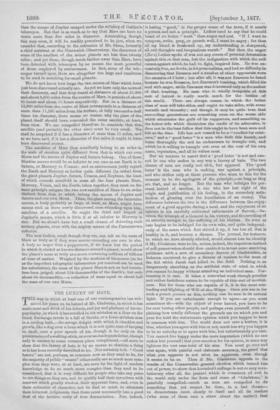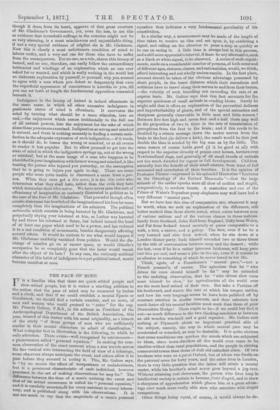THE LUXURY OF HATE.
THE way in which at least one of our contemporaries has sub-
sisted for years on its hatred of Mr. Gladstone, in which it has made meat and drink of his defects, and joy and gladness of his un- popularity„in which it has revelled in his mistakes as a Bear on the Stock Exchange revels in a fall of Stocks, or a fever-stricken man. in a cooling bath,—the savage delight with which it chuckles,and growls, like a dog over a bone which it is not quite sure of keeping to itself, over a poor speech of his, though it be only on the presentation of a walking-stick, or over an inadequate letter, though only in answer to some common-place compliment, —all seem to show that the luxury of hate is by no means so obsolete a thing as it has been recently described to be. Nor certainly is it. "Good haters." arc not, perhaps, so common now as they used to be, for the majority of public" causes" either really are so much more com.- plex than they were, or at least, are seen by the light of modern knowledge to be so much more complex than they used to, be considered, that it is very difficult for people who take any pains to see things as they are, not to qualify half their invectives with reserves which greatly weaken their apparent force, and, even in their estimates of character, not to. find so much to attenuate their bitterest judgments, that these must necessarily lose a good deal of the incisive unity of true denunciation. Nor, indeed, is hating " good," in the proper sense of the term, if it assails
person,and not a. principle. Luthea wied to say that he could. boast of no better " work " than anger and' zeal. " If I want to compose,, write, pray,. er preach well„ I must be angry ; for then all my blood, is freshened up,, my understanding is sharpened', all. evil, thoughts and, temptations: vanish." Bat then the anger: (Zera),Luther spoke of, was.not any excess of personal detestatiou. againet this or, that man„ but the indignation with which the evil; causes against, which, he had to fight, inspired him. He was ex-. cesaively free, no doubt, in, his personalities, and had no diffienity in cliaeovering that Easemus and a number a other opponents were the enemi.ea of Christ ;, but after elle it was.not Erasmus he hated becalm he, was Erasmus, but Erasmue's teaohing, which filled his soul with anger, while Erastnue was.denonneed only as the author: of that, teaching. No man who. is wholly incapable, of tithe.: sort. of hatred. is really, worth, =eh for the battles of: this world., There are always causes in which. the better. class of men will take aidea, and ought, to take. sides, with some warmth and intensity ; and though, it may be, quite true that succeeding generations BOO, something even on the worse side which attenuates the guilt of. its supporters, and something on the better side which diminishes' the. credit of its advocates, it does not in the least follow that this ought to have been seen and ,felt at the time. Life has not ceiteed to, be a "conflict for exiet- ence," and a " good' hater " is a man who feels this keenly, and. hates thoroughly the evil he endeavours to trample out; and which he is willing to trample out even at the cost of his own name, reputation,,and all he values most
But we venture to assert that a 'good hater "is not and can- not be one, whop makes in, any way a. lu,xury of hate. The two jclasses, of men are really. not akin, but opposed. The,' good j
hater' is the man who is making war against, a principle, and who strikes only at those persons, who, seem, to him for the moment to be the apologists of the principle,—so long as they are that,, and no longer. But the man who indulges his per- sonal hatred of another, is. One who has lost sight of the origin and justification of, his feeling, in the secondary satis- faction of gloating over the humiliation of an enemy. The, difference between the two is the difference between, the enjoy- ment of a good appetite during a meal, and the enjoyment of an epicure in his carefully cultivated refinements of flavour,—be- tween the triumph of a General in his victory, and the revelling of an atrocity-monger in the suffering of his victims. So soon as bate begins to be indulged for its own sake„ and quite independ- ently of the cause which first stirred it up, it has lost all that is healthy in it, and become a disease. The journal, for instance, to which we have already alluded, would almost lose its identity if Mr. Gladstone were to die, unless, indeed, the imperious instinct , of seit-preeervation should then enable it to invest. some surviving. j politician with a sort of secondary. flavour of Gladatoniain, as ,Itebecca contrived to give a flavour of venison to' the meat of j the kid which Jacob had killed in the field. Nothing is so, ;dangerously absorbing as the artificial state of mind in which you. cannothe. happy without attacking an individual, man. For- tunately it is rare, it takes a somewhat weak though peculiar and rather fastidious nature to be capable of this. sort of morbid- ness. But for those who are capable of it, it is the. most mis- leading and blighting of Will.of-the-Wisps. Once you are in for such a grande passion as this, nothing. can be seen in its natural light. If you are unfortunate enough to agree—as you must sometimes do—with the object of your hatred, you have to be for ever boring other people, and perhaps even yourself, with ex- plaining how totally different the grounds are on which you and your foe hold the unfortunate opinion which you happen to have in common with him. The world does not care a button, it is true, whether you agree with him or not, much less why you happen to be so unlucky as to agree with him, but unfortunately you care. You cannot live happy under the mere imputation (which no one makes but yourself) that your sanction for his opinion, in some way lightens the vast sunwtotal of his sins. You must go over and over again, with painful and elaborate accuracy, the proof that what, you. approve is not what lie approves, even, though it seems to be so. Thus if. Mr. Gladstone appeals to the results of the Conservative general election which, turned: him out of power, to. show that household, suffrage is not so very revo- lutionary after all, the journal which is conscious of evil in the world only under the form and name of "Gladstone," is painfully compelled—much as men are compelled to do something that yet cannot be done, in a, bad dream— to- demonstrate most clearly to itself and all its readers (who none of them care a straw about the matter) that though it does, from its heart, approve of that great overturn of Mr. Gladstone's Government, yet, none the less, to use this as evidence that household suffrage in the counties might not be so very alarming, is a most mischievous and unjustifiable thing, if not a very special evidence of original sin in Mr. Gladstone. Now this is clearly a most unfortunate condition of mind to labour under, and a very sad one for those who have to suffer from the consequences. For no one, as a rule, shares this luxury of hatred, and no one, therefore, can easily follow the extraordinary intricacies and windings of an explanation which no one ever asked for or wanted, and which is really nothing in the world but an elaborate explanation by yourself, to yourself, why you seemed to agree with a man whom you detest so desperately that even the superficial appearance of concurrence is horrible to you, till you can set forth at length the fundamental opposition concealed beneath it.
Indulgence in the luxury of hatred is indeed effeminate in the same sense in which all other excessive indulgence in passionate states of mind is effeminate. It enervates the mind by turning what should be a mere stimulus, into an end,—the enjoyment which comes incidentally in the full use of all natural powers, into the enjoyment for the sake of which alone these powers are exercised. Indignation at wrong and mischief is natural, and there is nothing unmanly in finding a certain satis- faction in the adequate expression of such indignation,—if it tends, as it should do, to lessen the wrong or mischief, or at all events to render it less popular. But to allow yourself to get into the state of mind in which the indignation springs up, not at the wrong or mischief, but at the mere imago of a man who happens to be identified in your imagination with fermer wrong and mischief, is like beating the person who injured you yesterday, on the assumption that he is going to injure you again to-day. There are some people who seem quite unable to disconnect a cause from a per- son. When they once get a bete noire, it is the bite noire who determines what they shall hate, rather than the evils they hate which determine their betes noires. We have never seen this sort of effeminacy of imagination so curiously illustrated in politics as in the case of the foes of Mr. Gladstone. That powerful though often erratic statesman has bewitched the imaginations of his foes far more completely than the imaginations of his admirers. The political melancolia which consists in being haunted by Mr. Gladstone, and perpetually shying your inkstand at him, as Luther was haunted by and threw his inkstand at Satan, has indeed turned the head of at least one paper which used to be a power, and has reduced it to a sad condition of monomania, besides dangerously affecting several others. It would be curious to see what would happen if Mr. Gladstone suddenly vanished from politics. Would the dis- charge of missiles go on at vacant space, or would Othello's occupation be so completely gone that the hater would vanish after the object of its hate ? In any case, the curiously artificial character of this habit of indulgence in a pet political hatred, would become manifest at once.































 Previous page
Previous page